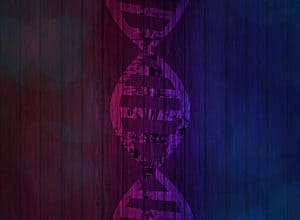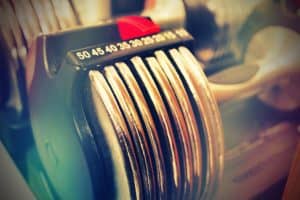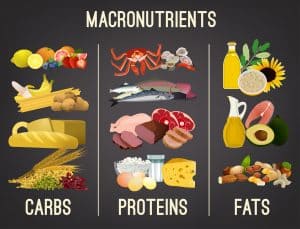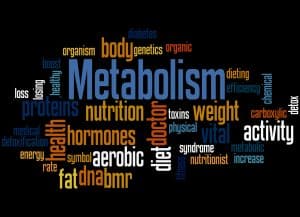I believed I was doing everything right—hitting the gym and keeping the calorie intake under control.
Yet, despite this—I still felt lethargic and was carrying too much weight. It was getting me down.
Unless I did something soon—I knew I was going to have a flabby body for the rest of my life—and no more beach vacations.
Incredibly, a chance discussion led me to gut health—and it was an intestinal revolution.
Let me reveal its shocking secrets.
Why Is Having a Healthy Gut Essential?
I’m going to state the obvious.
Suffering from gastrointestinal ulcers, food poisoning, dysentery or cancer can’t be considered “healthy.” And these ailments, which in some cases can be fatal, are wherever possible, to be avoided.
Yet, that’s not the “health” we are talking about here.
Instead, this article is concerned with the variety and multitude of beneficial bacteria in your gut. Researchers indicate that at any one time—you have about 1000-1150 bacteria species (collectively known as the microbiome) quite happily taking residence in your large intestine.
Remarkably, this microbiome makes up around 40 trillion bacterial cells in your body—as opposed to 30 trillion human cells. So, in fact, you’re more bacteria than human.
However, your upbringing has played its part in your current gut health.
Research indicates that our “normal” bacterial levels are determined by:
- Your mother—as a fetus, your intestines began to be populated by bacteria passed through the placenta—the greater variety she had, the more you received.
- Mode of delivery—vaginal and C-section birth exposes the new-born to different species of bacteria.
- Breastfeeding—natural milk delivers more bacteria than formula.
- Environment—playing in the dirt, exposure to animals, other children and adults can all have a beneficial effect on developing healthy bacteria.
- Antibiotics—overuse can damage bacteria—which may never recover.
These single-celled organisms are beneficial for health as they:
- Assist with efficient food digestion.
- Boost heart health.
- Lower cholesterol.
- Protect against diabetes.
- Inhibit the development of mental illness.
- Most importantly for this article, they can promote a healthy weight.
These benefits sound incredible, right? So why aren’t we all walking around as the pinnacles of fitness?
The issue is that in addition to these “good” bacteria, there’s the “bad.” Each are battling for control even as you sit there reading this article—known as dysbiosis.
If the negatively impacting bacteria have the upper hand, this can lead to:
- IBS (irritable bowel syndrome).
- Arthritis.
- Encephalomyelitis (brain inflammation).
- Lupus.
- Enteropathy (intestinal disease).
- Depression.
- Autism.
- Obesity.
While many of the above conditions are rare—the most common result of an unfavorable bacteria ratio is obesity and the inability to lose weight. An issue explored next.
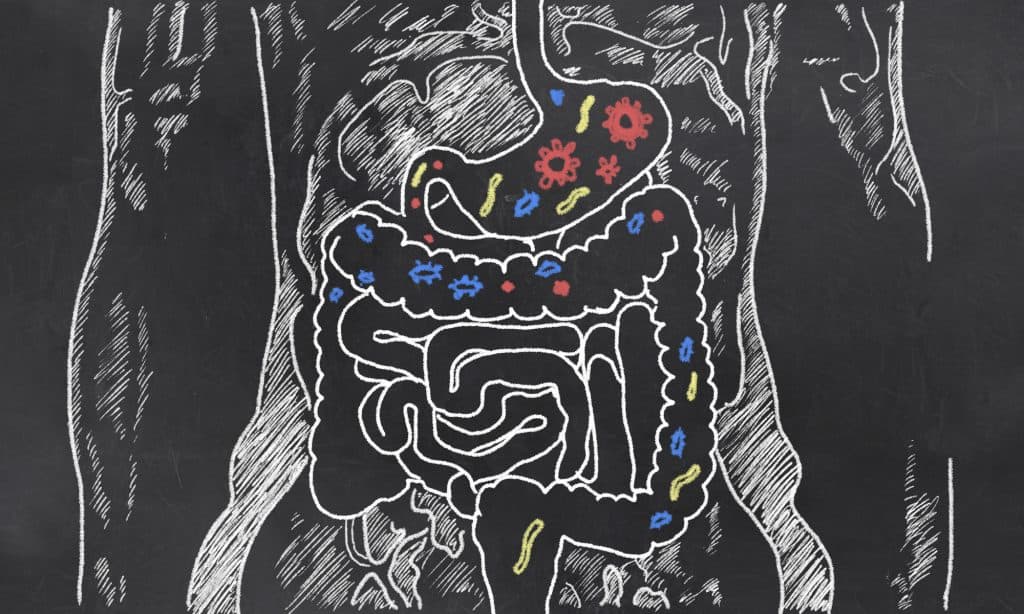
Weight and a Healthy Gut
Here’s the truth:
Your “good” and “bad” intestinal bacteria influence your weight.
Researchers in 2016 concluded that manipulating your gut microbiome can both increase fat loss and prevent obesity.
There are certain unwelcome bacteria than promote fat gain—although not an exclusive list, these include—Shigella, Firmicutes, Enterobacter, Desulfovibrionaceae, Klebsiella and Escherichia.
They increase weight gain by:
- Promoting the accumulation of adipose (fat) tissue.
- Increasing levels of cholesterol, triglycerides and fat phospholipids.
- Elevating low-grade inflammation—a cause of obesity.
- Raising insulin resistance.
- Increasing hunger levels.
Conversely, other bacteria such as Lactobacillus casei, Bifidobacterium, and Lactobacillus rhamnosus act in the opposite way. These bacteria “friends” can promote fat loss, provide a feeling of satiety, and reduce inflammation.
Hence, it makes sense that in order to lose weight efficiently, and prevent gain, you need to ensure that your beneficial bacteria outnumber the detrimental.
However, you can’t return to the womb or start breastfeeding—and I wouldn’t recommend eating some mud.
Yet, there are two simple and proven ways to elevate gut health—diet and nutrition.
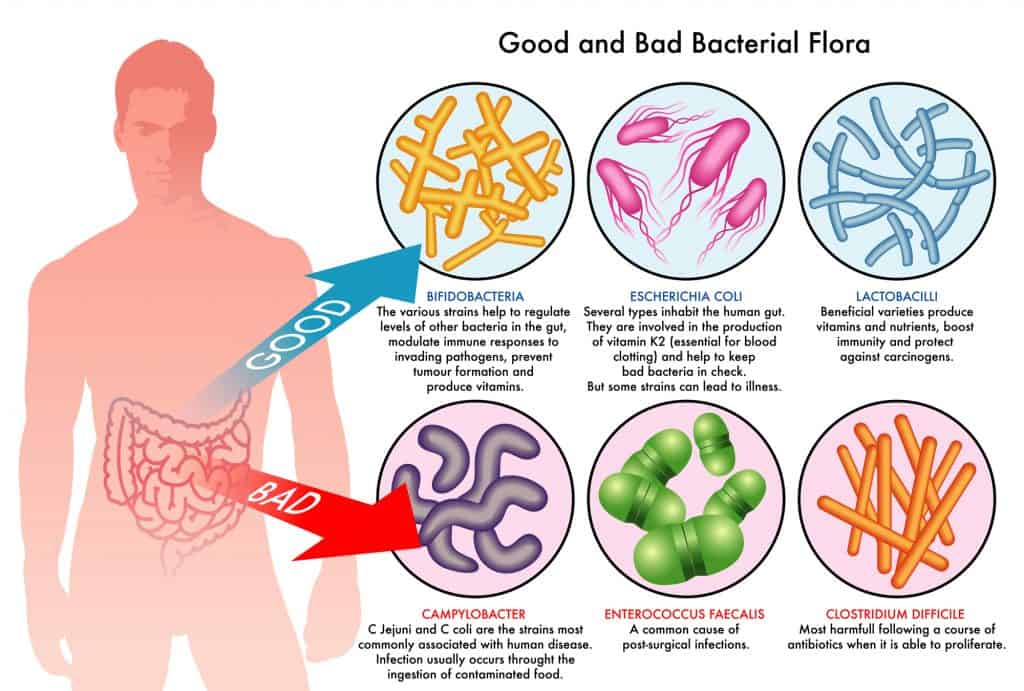
Diet for a Healthy Gut
It doesn’t sound very appealing—but the ideal method of improving gut health through diet is to eat bacteria.
That’s it.
The problem is, people and the media often use this word in a pejorative sense—inferring numerous negative connotations. All humans aren’t intrinsically evil—and the same goes for bacteria.
Generally speaking, intestinal-boosting foods are either prebiotic or probiotic.
- Prebiotic—usually fiber-based carbohydrate foods which provide nutrition to the healthy bacteria in your gut.
- Probiotic—live bacteria found in staples that enter and then make their home in your intestines.
Here are the best ways to achieve a fat-busting healthy intestine through food.
1
Keep Your Diet Diverse
Scientists agree that for the healthiest gut—your microbiome needs to be as diverse as possible.
Studies illustrate that the more varied your diet, the higher the chance that you will be ingesting different types of fat-shedding bacteria.
Unfortunately, for those of us living in the West, our food choices are particularly restrictive—being mainly high in fat and rich with sugar. Current estimates indicate that around 75 percent of our diet consists of just five animal species and 12 crops.
Conversely, those people living in rural areas of South America and Africa have a more assorted diet and exhibit greater microbial diversity.
Hence, take a chance and try some new and different foods in your meals.
2
Consume Fermented Foods
These staples deliver a double-whammy in that they’re both prebiotic and probiotic—that is, they both elevate good bacteria and provide a nutritional source for them.
Many of these products include the fat-reducing Bifidobacterium, Lactobacillus and Bacillus.
Excellent examples of fermented foods are:
- Kimchi.
- Sauerkraut.
- Yogurt.
- Kefir.
- Tempeh.
- Kombucha.
Possibly one of the most widely available on this list is yogurt. Try to obtain the natural version—as many, especially the flavored variety, can contain high levels of sugar.
Research shows that yogurt can boost the weight-improving Lactobacillus and reduce the fat-gaining Enterobacteriaceae.
3
Avoid Artificial Sweeteners
Many people believe that they’re improving their fat-shedding abilities by dropping sugar in favor of artificial sweeteners.
However, clinical studies from 2014 explain that the commonly-sold aspartame elevates levels of the weight-gaining bacteria Enterobacteriaceae and Clostridium leptum.
Instead, look to use healthier sweetening options such as Stevia, Yacon syrup and honey.
4
Eat Prebiotic Foods
To ensure that your fat-busting bacteria are working at optimum levels, choose foods that can deliver the essential nutrients they need to function.
The most potent examples are:
- Garlic—includes the prebiotic fiber inulin and promotes the growth of the pound-shedding Bifidobacterium.
- Chicory root—containing fiber which is about 47 percent inulin—chicory can also improve digestion and prevent constipation.
- Bananas—the prebiotic fiber in these fruits is known to elevate healthy intestinal flora and lower bloating.
5
Eat Dirty
I’m not saying don’t wash your vegetables or fruits before eating them—but a quick rinse is usually sufficient to remove any unwanted detritus.
Like a child playing in the mud—a few ingested bacteria from soil generally will not do you any harm—in fact, it could boost your intestinal health.
Furthermore, don’t fry, boil, or bake your plant foods to within an inch of their lives. You are essentially sterilizing them—removing the healthy bacteria that can help you to lose weight.
Eat as much fresh produce as you can raw—cauliflower, carrots, peas, celery and bell peppers are often much more flavorsome when uncooked.
6
Try The Ultimate Morning Concoction
An increasingly popular morning shake in the fitness industry is the following gut-boosting mixture. While it has a “novel” taste, it can kick-start your day with an intestinal treat.
- Organic lemon juice—contains pectin, a fiber that can inhibit harmful bacteria and act as a prebiotic.
- Apple cider vinegar—has an antimicrobial effect on the harmful bacteria Staphylococcus aureus, Escherichia coli and Candida albicans.
- Turmeric—while few studies exist on turmeric’s effects on bacteria—it’s suggested that it may promote diversity of the microbiome.
- Fermented glutamine—research shows this compound can reduce the chance of developing IBS.
- Manuka honey—scientists explain that this natural foodstuff has antibacterial properties on the unwanted intestinal flora.
- Organic greens powder—high in the essential bacteria boosters phytonutrients and fiber—missing from many of our diets.
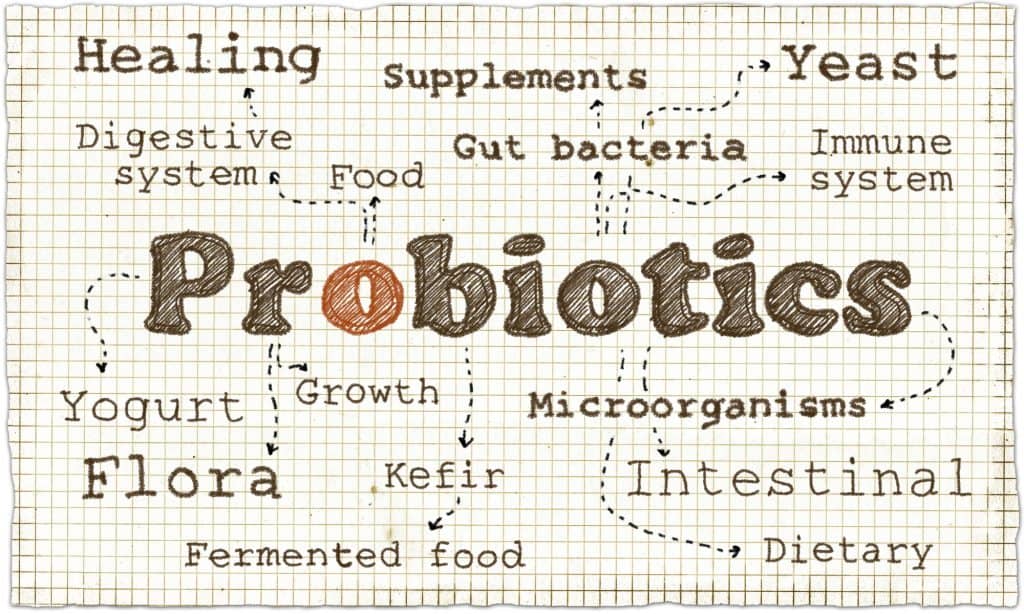
Supplementation for a Healthy Gut
If you’re finding it difficult to eat a variety of foods, or intolerances or allergies make it impossible—instead you can supplement.
Prebiotic Supplements
These products, in pill or powder form, contain fermentable fiber. This delivers food for beneficial bacteria—such as Bifidobacterium or Lactobacillus.
When selecting your supplement—remember that not all prebiotics are identical—some are particularly targeted at specific strains of bacteria.
While an effective way of delivering fiber—they can lead to abdominal bloating and cramping.
Probiotic Supplements
These products can be capsules, liquids or pills which contain live (hopefully) beneficial bacteria.
However, be careful—all probiotic supplements aren’t created equal. They can differ in the bacteria they contain and their concentrations.
Some manufacturers formulate probiotic supplements so they can pass all the way to your large intestine for heightened effects (known as gastro-resistant). Lesser varieties will not survive your stomach acid.
Key characteristics to look for in the best probiotics:
- A guarantee that the bacteria are live.
- Bacteria concentrations are itemized in colony-forming units (CFUs) and not milligrams—a greater indicator of its efficacy.
- Evidence that the supplement is gastro-resistant.
Other Supplements
In addition to the most popular pre and probiotics, other products that exhibit beneficial effects on the gut are:
- Magnesium—studies indicate that this mineral can promote healthy gut flora.
- Anthocyanins—scientists explain that supplementing with these flavonoids work as prebiotics for beneficial intestinal bacteria.
- Berberine—an alkaloid salt that has an antibacterial effect on the dangerous stomach flora of Streptococcus agalactiae and Escherichia coli.
The Takeaway
We often forget about our intestines when concentrating on dropping the pounds.
Placing a heavy emphasis on our muscles, macros, lungs and heart—our poor gut is often the neglected child.
Yet, this mighty organ is not only a crucial driving force behind overall wellbeing—but it’s also a vital factor in weight control.
Take steps to elevate your healthy bacteria with prebiotics—and remember to feed them with probiotics. Ideally, do both with your nutrition—but if impossible, there are some effective products on the market.
Looking after your gut health means a more toned, fitter and more attractive you.


